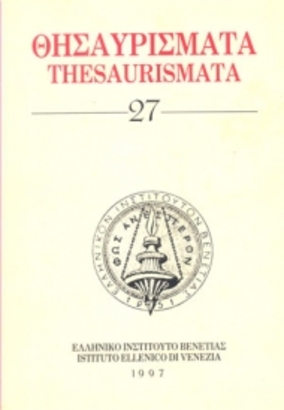Τα τρία αστέρια της γκιόστρας στον Ερωτόκριτο
Part of : Θησαυρίσματα ; Vol.30, 2000, pages 339-378
Issue:
Pages:
339-378
Author:
Abstract:
In this article it is shown that the idea (originally brought forward by David Holton) about the parallelism of the tournament and the main plot of the Erotokritos, which implies that the trio of champions of the tournament consisting of Rotokritos, Charidimos and Kypridimos reflects the threesome of the romance, i.e. Rotokritos, Kritidis (who is Rotokritos in disguise), and Aretousa, is sound. Rotokritos, who at the beginning of the story is pictured as Charidimos in reverse, later changes (in the disguise of Kritidis) into an exact copy of the Cretan knight. There is also a meaningful relationship between the young Aretousa and Kypridimos, both of whom appear to be enemies of Erotas (Aretousa through the lessons of her old trusted nurse Phrosyni). And thus the tournament is brought to completion with a fight between the two lovers (after the removal of the third person, Charidimos of Crete): Rotokritos (= Erotas) and Kypridimos (= the young Aretousa). Just as the
two lovers are left alone at the end of the romance, so they are in the «grand finale» of the tournament.
Subject:
Subject (LC):
Notes:
Περιέχει σημειώσεις, Δίπλα στο Βιτσέντζο Κορνάρο, τον αφηγητή του και το Στ. Αλεξίου, τον εκδότη του, είμαι πολύ υποχρεωμένος σ’ ένα άλλο βασικό έργο χωρίς τη βοήθεια του οποίου η μελέτη αυτή δε θα γραφόταν, δηλαδή: Dia Μ. L. Philippides - David Holton (με την τεχνική συνεργασία του John L. Dawson), Του κύκλου τα γυρίσματα. Ο Ερωτόκριτος σε ηλεκτρονική ανάλυση, τ. Β', Γ', Δ', Αθήνα, Ερμής, 1996. Με την ευκαιρία αυτή θα ήθελα επίσης να εκφράσω την ευγνωμοσύνη μου στη φίλη και συνάδελφο Margaret Alexiou, που μου εξασφάλισε το δικαίωμα να μπαίνω μέσα στις περίφημες βιβλιοθήκες
του πανεπιστημίου Harvard. Ευχαριστώ θερμότατα και τη φίλη Ναταλία Δεληγιαννάκη, που επιμελήθηκε τη μελέτη αυτή («καθαρίζοντας» μ.ά. τα «ελληνικά» μου) για μια συλλογή μελετημάτων για τον Ερωτόκριτο που, δυστυχώς, τελικά δεν πραγματοποιήθηκε.




